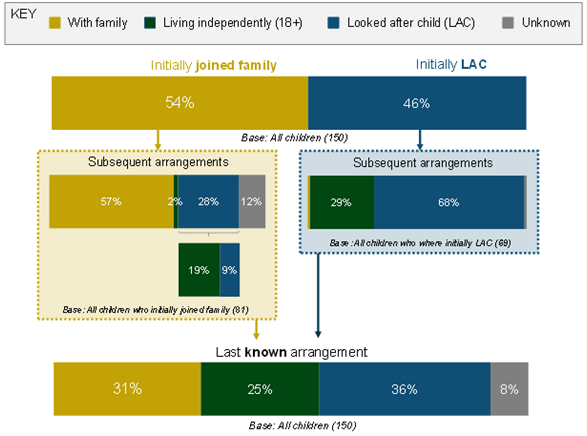At a glance
The Department for Education sought to fill a knowledge gap around the experiences of unaccompanied asylum-seeking children that joined family in England under the Dublin III Regulation. A mixed-methodology study revealed the social and cultural factors that often led to positive placements for these young people, as well as the drivers behind negative experiences. By considering this process from the perspective of Local Authorities, the study also identified key challenges, as well as positive factors that helped young people settle in their areas.
Challenges and objectives
The DfE acknowledged that little was known about the success of placements of children and young people under the Dublin III Regulation and how these individuals experienced their entry into England. They wanted to collect quantitative data to help map these young peoples’ journeys to England, and to better understand what they did after arriving; as well as gathering qualitative findings to gain insight into the young peoples’ experience of the process, and into the social, cultural and psychological issues that were the drivers of success and failure of these placements.

Solution
After testing its feasibility with a small number of Local Authorities, IFF launched a quantitative data collection tool that was sent out to all Local Authorities. It was designed to gather information about each child that they received under the Dublin III Regulation or as part of the Calais Camp Clearance. Encompassing data from 71 Local Authorities, the study tracked the journeys of 150 unaccompanied children and young people, who generally ended up living with their family members, being cared for by the Local Authority as a looked after child or living independently.
IFF also conducted qualitative interviews to discuss these young peoples’ experiences, challenges and views on the process. This was supplemented by qualitative interviews with teams at Local Authorities that had processed these asylum claims and welcomed these young people to England to better understand how the process worked from their perspective.

Impact
The study demonstrated the value of a mixed method design, with DfE able to collect quantitative data about the types of journeys these young people could experience alongside qualitative discussions which helped unpick the reasons behind particular outcomes.
DfE learned that fewer than a third of children and young people were still living with their family member when the Local Authority was last aware of their living arrangement (31%). While this sounded negative, the qualitative discussions showed that in some instances it was in the interest of both the young people and their families for them to live independently or to be looked after by the Local Authority. It also showed that a move away from the planned placement did not always mean a breakdown of family relationships and young people were sometimes also able to derive positive benefits from proximity to family even if they were not living with them. At the same time, there were other cases where this was because the initial placement had been highly unsuitable. The qualitative findings augmented the quantitative in a really important way, showing the complexity of the journeys experienced by these young people.
The findings also demonstrated the importance of the timing, content and manner of the information that was given to Local Authorities about a child or young person’s upcoming arrival, particularly on early notification. It was clear that improvements could be made to this process, which ultimately could benefit families, young people and Local Authorities, making entry to England easier for all involved.
The findings from this study will be considered in the development of any future policy in this area. The combination of the qualitative and quantitative insight will help DfE ensure that policies consider the needs of children and young people, their families and the Local Authorities that support them.
The last known arrangement for children entering the UK under the Dublin III Regulation or as part of the Calais Camp Clearance






